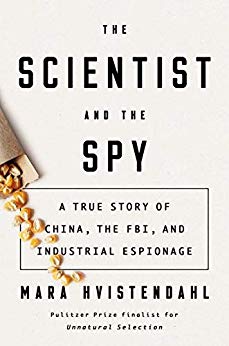
Welcome to Hitting the Books. With less than one in five Americans reading just for fun these days, we've done the hard work for you by scouring the internet for the most interesting, thought provoking books on science and technology we can find and delivering an easily digestible nugget of their stories.
The Scientist and the Spy: A True Story of China, The FBI, and Industrial Espionage
by Mara Hvistendahl

Despite ongoing concerns regarding their long-term safety and environmental impacts, genetically modified foods are massive money makers for the the companies that develop and market them. They're worth even more to the companies willing to lie, cheat, bribe, trespass and steal to get their hands on even a few precious samples.
In The Scientist and the Spy, author Mara Hvistendahl expertly walks readers through the fascinating history of industrial espionage and how the practice has impacted (as well as been effected by) the industrial and information revolutions -- all through the lens of a daring GMO corn heist perpetrated by Chinese nationals in America's heartland. I never figured that corn was such a hot commodity!
Industrial espionage is as old as industry itself. The oldest known recognition of intellectual property rights came thousands of years ago, in the ancient Greek city of Sybaris, when chefs presiding over extravagant feasts complained of scheming rivals stealing their recipes. The solution city leaders devised was to grant cooks exclusive rights to their concoctions for one year. Back then the target was literally the secret sauce. In the intervening centuries, as our choicest products progressed from gravy to engines to supercomputers, the metaphor remained.
The Byzantine Empire, imperial China, the Ottomans, Great Britain, America: Theft of one nation's technologies by another marked the transfer of power from one empire to the next almost as routinely as bloodshed. For most of history, industrial espionage was regarded as something that nations just did, much like spying for political or military secrets. The victor was the one who stole the spoils, while the act of theft was typically forgotten. History remembers the East India Company and its vast colonial tea plantations, but not the British botanist who journeyed to China's Fujian province improbably disguised as Qing nobility, his head shaved except for one long braid, to purloin the technique for processing tea leaves. It remembers delicate French white and blue ceramics, but not the Jesuit priest who traveled to China's imperial kilns to filch the technique for making hard- paste porcelain. And it remembers the industrialist Francis Cabot Lowell, father of Lowell, Massachusetts, but not his 1810 trip to England and Scotland, where he spent weeks touring factories and memorizing the blueprints that would allow him to "invent" the power loom on the western side of the Atlantic.
In most parts of the world until the mid-1990s, companies dealt with trade secrets theft through civil lawsuits. No international treaty or agreement explicitly tackled industrial espionage. In the United States just one federal statute did, and it only covered theft by a government employee. Then, a year before Mark Betten started his career at the FBI, President Clinton signed into law the Economic Espionage Act, which made trade secrets theft a federal crime. The 1996 law represented a seismic shift: It was the first time in American history that attacks on American business were branded as a national security threat.
The act was born in the wake of the Cold War, as intelligence leaders cast about for a new mission. In some ways industrial espionage was a logical choice. Technologies of all sorts were rapidly increasing in value, making them attractive to spies. The dawn of the internet and breakthroughs in global communications, meanwhile, provided more weak points than ever before for siphoning off information.
At the time, policy makers were particularly concerned about France, whose secret service chief had been blunt about his interest in obtaining American economic secrets. But critics suspected that the drive to designate industrial espionage as a federal crime was also about the intelligence agencies' interest in self- preservation. The fall of the Iron Curtain had made the mandate of the FBI and CIA unclear. Newspapers were running headlines like cold war's end brings enemy gap and cia— costly, inept, anachronistic. After he was sworn in as CIA director in 1991, Robert Gates had promptly written on a notepad, "New world out there. Adjust or die." Gates became a staunch advocate of the Economic Espionage Act.
Legal scholars pointed out that state law was deemed sufficient for a range of high-stakes crimes, including many types of murder. Why did trade secrets theft deserve different treatment? Senator Bill Bradley worried that economic espionage could become "a pretext for a new program of counterintelligence surveillance by the FBI of either foreigners or Americans." Others simply thought that the threat was inflated. "The law gives the FBI not only a cold war reason for being but a reason for using once again the formidable methods of the cold war," journalist Robert Dreyfuss wrote in The New Republic.
Whatever the reality, a consensus built in Washington that technical information was so dangerous a weapon when in the hands of a foreign company or government that America needed tougher tools to deal with it. The 1990s was an era of intense globalization and consolidation, and multinational corporations were advancing into new markets where they faced foreign competitors. Stiffer penalties provided a way to hobble those competitors in court, or at least bog them down in costly litigation. And because economic espionage was a federal crime, corporate lawyers could step back and let federal prosecutors bring charges on their companies' behalf.
Large corporations were among the law's biggest backers. Some even felt that the United States should go further, by actively spying on other countries' firms— a proposal that was rejected mainly because it was impractical, not because of strong moral objections.
In the years following the Economic Espionage Act's passage, the Justice Department brought cases involving cancer drugs, software programs, and razors. Then, on September 11, 2001, terrorists associated with al- Qaeda hijacked four commercial airplanes and steered two of them into the World Trade Center. As the United States waged an assault on terrorism, economic espionage faded from view.
In the late 2000s, when trade secrets theft investigations picked up again, the focus shifted to China. Western elites agreed that while other countries, including nineteenth-century America, had relied on industrial spying to advance technologically, China took it to a new level. "In a manner of speaking, the United States stole books; China steals libraries," quipped James A. Lewis, an expert on industrial espionage at the Center for Strategic and International Studies. It helped that China's rise as a global economic power had coincided with a democratization of spy tools. The 160-kilobyte floppy disk, just small enough to slip into a purse, was replaced by the 128- gigabyte flash drive, with nearly 1 million times more storage compressed into a gadget as slim as a pinky. Clunky recording devices gave way to sophisticated spyware that allowed for commandeering the microphone and camera of a user's smartphone.
Unsophisticated cyberattacks could expose whole company servers to plundering. In 2009, as Mark Betten moved into his second decade at the FBI, the bureau created a dedicated Economic Espionage Unit.
On May 2, 2011, President Obama announced that Osama bin Laden had been killed in an American military operation in Pakistan. The menace of terrorism, it appeared, had subsided. The emergence of Islamic State militants would later shake this sense of security, but in the meantime the national security establishment moved on to a different threat: economic espionage. The day after Obama announced bin Laden's death, the Pioneer contract farmer spotted a Chinese man in a cornfield in Tama County, Iowa.
From SCIENTIST AND THE SPY: A True Story of China, The FBI, and Industrial Espionage by Mara Hvistendahl published on February 4, 2020 by Riverhead, an imprint of Penguin Publishing Group, a division of Penguin Random House LLC. Copyright © 2020 Mara Hvistendahl.
via engadget.com



0 Response to "Hitting the Books: A brief history of industrial espionage and corn"
Post a Comment